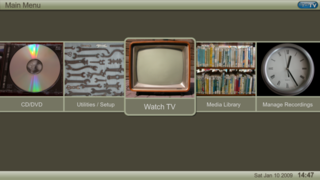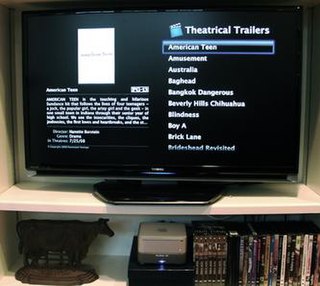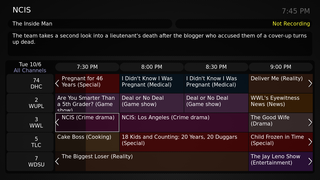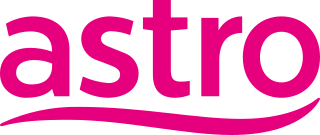Related Research Articles

TiVo Corporation, formerly known as the Rovi Corporation and Macrovision Solutions Corporation, was an American technology company. Headquartered in San Jose, California, the company is primarily involved in licensing its intellectual property within the consumer electronics industry, including digital rights management, electronic program guide software, and metadata. The company holds over 6,000 pending and registered patents. The company also provides analytics and recommendation platforms for the video industry.

TiVo is a digital video recorder (DVR) developed and marketed by Xperi and introduced in 1999. TiVo provides an on-screen guide of scheduled broadcast programming television programs, whose features include "OnePass" schedules which record every new episode of a series, and "WishList" searches which allow the user to find and record shows that match their interests by title, actor, director, category, or keyword. TiVo also provides a range of features when the TiVo DVR is connected to a home network, including film and TV show downloads, advanced search, online scheduling, and at one time, personal photo viewing and local music playback.
ReplayTV was a former DVR company that from 1999 until 2005, produced a brand of digital video recorders (DVR), a term synonymous with personal video recorder (PVR). It is a consumer video device which allows users to capture television programming to internal hard disk storage for later viewing. ReplayTV was founded in September 1997 by future Roku founder Anthony Wood, who was president and CEO of ReplayTV until August 2001.
A digital video recorder (DVR) is an electronic device that records video in a digital format to a disk drive, USB flash drive, SD memory card, SSD or other local or networked mass storage device. The term includes set-top boxes with direct to disk recording, portable media players and TV gateways with recording capability, and digital camcorders. Personal computers are often connected to video capture devices and used as DVRs; in such cases the application software used to record video is an integral part of the DVR. Many DVRs are classified as consumer electronic devices; such devices may alternatively be referred to as personal video recorders (PVRs), particularly in Canada. Similar small devices with built-in displays and SSD support may be used for professional film or video production, as these recorders often do not have the limitations that built-in recorders in cameras have, offering wider codec support, the removal of recording time limitations and higher bitrates.

Sky Network Television Limited, more commonly known as Sky, is a New Zealand broadcasting company that provides pay television services via satellite, media streaming services and broadband internet services. As of 31 December 2022, Sky had 1,023,378 residential television subscribers consisting of 517,003 satellite subscribers and 506,375 streaming subscribers. Additionally, Sky had 23,156 broadband customers. Despite the similarity of name, branding and services, such as Sky Go and MySky shared with its European equivalent, Sky, there is no connection between the companies.

MythTV is a free and open-source home entertainment application with a simplified "10-foot user interface" design for the living room TV. It turns a computer with the necessary hardware into a network streaming digital video recorder, a digital multimedia home entertainment system, or home theater personal computer. It can be considered a free and open-source alternative to TiVo or Windows Media Center. It runs on various operating systems, primarily Linux, macOS, and FreeBSD.

A home theater PC (HTPC) or media center computer is a convergent device that combines some or all the capabilities of a personal computer with a software application that focuses on video, photo, audio playback, and sometimes video recording functionality. Since the mid-2000s, other types of consumer electronics, including game consoles and dedicated media devices, have crossed over to manage video and music content. The term "media center" also refers to specialized application software designed to run on standard personal computers.

Electronic programming guides (EPGs) and interactive programming guides (IPGs) are menu-based systems that provide users of television, radio and other media applications with continuously updated menus that display scheduling information for current and upcoming broadcast programming. Some guides also feature backward scrolling to promote their catch up content. They are commonly known as guides or TV guides.
Beyond TV is digital video recorder/media center software for Microsoft Windows produced by the American company SnapStream. The software was originally released in 2000 as a Personal Video Station. Like most media center software, and devices such as TiVo and Sky+, Beyond TV has a 10-foot user interface design for the living-room TV. Allowing you to watch, pause and record live TV, as well as schedule recording. It also allows you to search for a show in its electronic program guide, enabling the user to find out when shows are on without having to search through the listings themselves.

Sky+ is a discontinued personal video recorder (PVR) and subscription service from the satellite television provider Sky in the UK and Ireland. Launched in September 2001, it allows customers to record, pause and instantly rewind live TV. The system performs these functions using an internal hard drive inside the Sky+ set top box, an upgrade over the standard Digibox.
Guide Plus+, TV Guide On Screen, TV Guide Daily, TV Guide Plus+ and Guide Plus+ Gold or G-Guide are brand names for an interactive electronic program guide (EPG) system that is used in consumer electronics products, such as television sets, DVD recorders, personal video recorders, and other digital television devices. It offers interactive on-screen program listings that enable viewers to navigate, sort, select and schedule television programming for viewing and recording. The differing names are only used for marketing purposes – the entire system is owned by Rovi Corporation, the successor to Gemstar-TV Guide International. In 2016, Rovi acquired digital video recorder maker TiVo Inc., and renamed itself TiVo Corporation.
The Nextcom R5000-HD is a popular Windows-based system for digitally capturing HD (high-definition) and SD (standard-definition) TV content from satellite TV and cable TV sources. A modification is required to the set-top box, giving it a USB 2.0 output that is connected to a PC. The digital video recorder (DVR) and companion personal video recorder (PVR) software runs on any Windows 2000, Windows XP, Windows 7 and Windows 10 system and can record just about any content to hard disk or D-VHS tape. Programming can be encoded in MPEG-2, or MPEG-4 type AVC/H.264 formats. MPEG transport streams compliant with the ISO 13818-1 specification are created.
TiVo digital video recorders encompass a number of digital video recorder (DVR) models that TiVo Corporation designed. Features may vary, but a common feature is that all of the units listed here require TiVo service and use its operating system.
V+ is a set-top box for Virgin Media's Virgin TV service, which provides personal video recording (PVR) and high definition (HD) functionality to customers who subscribe to the service. Virgin TV have taken a different approach from rival Sky's Sky+ and later Sky+ HD services, by implementing a rental scheme for the V+ Box. When Virgin TV was launched, there was an installation charge and a monthly charge for all customers with a discount for XL customers. On 1 June 2007 pricing was revised, with all customers paying a one-off set-up fee and TV M and L customers paid a monthly charge, while TV XL customers had no extra charges. Various deals to lower the set-up fee have been made available to all customers in order to compete with rival Sky.
Freeview is New Zealand's free-to-air television platform. It is operated by a joint venture between the country's major free-to-air broadcasters – government-owned Television New Zealand and Radio New Zealand, government-subsidised Whakaata Māori, and the American-owned Warner Bros. Discovery.
Schedules Direct is a non-profit organization that provides a low-cost television program listing service for open source and freeware digital video recorders.
In broadcasting, time shifting is the recording of programming to a storage medium to be viewed or listened to after the live broadcasting. Typically, this refers to TV programming but it can also refer to radio shows via podcasts.

All-Asian Satellite Television and Radio Operator, d/b/a Astro, is a Malaysian satellite television, streaming television and IPTV provider. It operates in Malaysia and Brunei and operates from the All Asia Broadcast Centre (AABC) in Kuala Lumpur and MEASAT in Cyberjaya. In 2016, the company was recorded as achieving 71% household penetration in Malaysia. It was granted an exclusive license as the sole pay-television provider by the Malaysian federal government until 2017. Astro is a wholly-owned subsidiary of Astro Malaysia Holdings Berhad and is operated by MEASAT Broadcast Network Systems Sdn. Bhd.
VBox Home TV gateway is a network-enabled live TV tuner and PVR HDTV set-top-box produced by VBox Communications Ltd.
Astro B.yond is a Malaysian first high-definition television (HDTV) service from Astro. Launched by Astro on 11 December 2009. The roll out of these services is estimated to cost some RM200 million, including marketing and operating costs of approximately RM150 million, over the next financial year, ahead of revenue and earnings from these services.
References
- 1 2 Tan, Maryann. "The idiot box gets smart". Archived from the original on 29 December 2008. Retrieved 23 January 2009.
- ↑ http://my.lge.com/ir/html/ABboards.do?action=read&group_code=AB&list_code=NARCH_MENU&seq=5633&page=5&target=news_read.jsp%5B%5D
- ↑ "Astro Max | Ourplaypen Gadgets, Toys & Stuff". Archived from the original on 12 April 2019. Retrieved 19 February 2009.
- ↑ Mustapha Kamil (13 October 2008). "New Astro contents to pack a bigger punch". Business Times. Archived from the original on 21 October 2008. Retrieved 16 October 2008.
- ↑ Bakht, Asiya (20 October 2008). "Astro calls review". Archived from the original on 17 July 2009. Retrieved 23 January 2009.